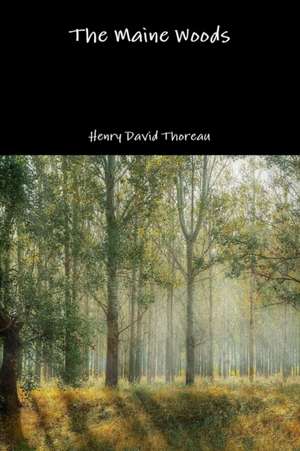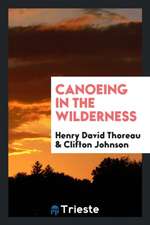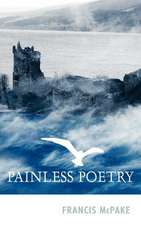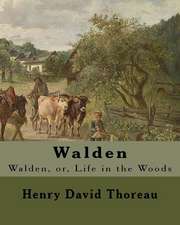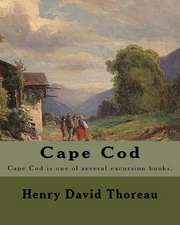The Maine Woods
Autor Henry David Thoreauen Limba Engleză Paperback – 11 iul 2018
Posthumously published in 1864, The Maine Woods depicts Henry David Thoreau’s experiences in the forests of Maine, and expands on the author’s transcendental theories on the relation of humanity to Nature. On Mount Katahdin, he faces a primal, untamed Nature. Katahdin is a place “not even scarred by man, but it was a specimen of what God saw fit to make this world.” In Maine he comes in contact with “rocks, trees, wind and solid earth” as though he were witness to the creation itself. Of equal importance, The Maine Woods depicts Thoreau’s contact with the American Indians and depicts his tribal education of learning the language, customs, and mores of the Penobscot people. Thoreau attempts to learn and speak the Abenaki language and becomes fascinated with its direct translation of natural phenomena as in the word sebamook—a river estuary that never loses is water despite having an outlet because it also has an inlet. The Maine Woods illustrates the author’s deeper understanding of the complexities of the primal wilderness of uplifted rocky summits in Maine and provides the reader with the pungent aroma of balsam firs, black spruce, mosses, and ferns as only Thoreau could. This new, redesigned edition features an insightful foreword by Thoreau scholar Richard Francis Fleck.
- Redesigned edition featuring an insightful foreword by Thoreau scholar Richard Francis Fleck.
- Fleck is a well-respected authority on Thoreau and the author of many books including Henry Thoreau and John Muir Among the Indians.
- Henry David Thoreau (July 12, 1817 – May 6, 1862) was an American author, poet, philosopher, abolitionist, naturalist, tax resister, development critic, surveyor, historian, and leading transcendentalist.
- This book was first published in 1864 (composed partly of articles he had written earlier for periodicals) and still in print, is an insightful reporter’s picture of a rugged wilderness the moment before being irrevocably altered by armies of loggers.
- Today the virgin forest seen by Thoreau is gone; trees have been cut, regrown, and harvested again. But modern travelers — hikers, campers, hunters, fishers, canoeists or back road wanderers — will still find, as Thoreau did, a land “more grim and wild than you had anticipated.” It’s also pin-drop tranquil, teeming with wildlife and, in places, challenging to reach. (NYTimes)
- Following Thoreau into the Maine Woods is hardly a new idea, but it is becoming easier. The Thoreau-Wabanaki Trail was inaugurated, delineating and celebrating Thoreau’s passage on routes that Penobscot Indians had used for thousands of years. (NYTimes)
- Nature tourism is a $37 billion annual industry in the United States (Outdoor Industry Association).
| Toate formatele și edițiile | Preț | Express |
|---|---|---|
| Paperback (9) | 75.87 lei 6-8 săpt. | |
| Penguin Books – 31 aug 1988 | 97.72 lei 3-5 săpt. | |
| Westwinds Press – 31 ian 2014 | 103.26 lei 3-5 săpt. | |
| CREATESPACE – | 118.91 lei 3-5 săpt. | |
| Digireads.com – 17 iun 2019 | 75.87 lei 6-8 săpt. | |
| Lulu.Com – 11 iul 2018 | 89.57 lei 6-8 săpt. | |
| Black Curtain Press – 15 mar 2014 | 98.31 lei 6-8 săpt. | |
| Digireads.com – 31 dec 2005 | 103.03 lei 38-44 zile | |
| Bibliotech Press – 12 iul 2023 | 114.71 lei 6-8 săpt. | |
| COSIMO CLASSICS – 30 iun 2009 | 126.78 lei 6-8 săpt. | |
| Hardback (1) | 205.81 lei 6-8 săpt. | |
| Bibliotech Press – 12 iul 2023 | 205.81 lei 6-8 săpt. |
Preț: 89.57 lei
Nou
Puncte Express: 134
Preț estimativ în valută:
17.14€ • 17.71$ • 14.26£
17.14€ • 17.71$ • 14.26£
Carte tipărită la comandă
Livrare economică 19 martie-02 aprilie
Preluare comenzi: 021 569.72.76
Specificații
ISBN-13: 9781387942824
ISBN-10: 1387942824
Pagini: 204
Dimensiuni: 152 x 229 x 13 mm
Greutate: 0.3 kg
Editura: Lulu.Com
ISBN-10: 1387942824
Pagini: 204
Dimensiuni: 152 x 229 x 13 mm
Greutate: 0.3 kg
Editura: Lulu.Com
Notă biografică
Henry David Thoreau (July 12, 1817 - May 6, 1862) was an American essayist, poet, and philosopher. A leading transcendentalist, Thoreau is best known for his book Walden, a reflection upon simple living in natural surroundings, and his essay "Civil Disobedience", an argument for disobedience to an unjust state. Thoreau's books, articles, essays, journals, and poetry amount to more than 20 volumes. Among his lasting contributions are his writings on natural history and philosophy, in which he anticipated the methods and findings of ecology and environmental history, two sources of modern-day environmentalism. His literary style interweaves close observation of nature, personal experience, pointed rhetoric, symbolic meanings, and historical lore, while displaying a poetic sensibility, philosophical austerity, and Yankee attention to practical detail. He was also deeply interested in the idea of survival in the face of hostile elements, historical change, and natural decay; at the same time he advocated abandoning waste and illusion in order to discover life's true essential needs. He was a lifelong abolitionist, delivering lectures that attacked the Fugitive Slave Law while praising the writings of Wendell Phillips and defending the abolitionist John Brown. Thoreau's philosophy of civil disobedience later influenced the political thoughts and actions of such notable figures as Leo Tolstoy, Mahatma Gandhi, and Martin Luther King Jr.
Cuprins
FOREWORD:
“DEEP IN THE WOODS WITH
HENRY THOREAU” by Richard F. Fleck
INTRODUCTORY NOTE
KTAADN
CHESUNCOOK
THE ALLEOASH AND EAST BRANCH
APPENDIX
I. Trees
II. Flowers and Shrubs
III. List of Plants
IV. List of Birds
V. Quadrupeds
VI. Outfit for an Excursion
VII. A List of Indian Words
“DEEP IN THE WOODS WITH
HENRY THOREAU” by Richard F. Fleck
INTRODUCTORY NOTE
KTAADN
CHESUNCOOK
THE ALLEOASH AND EAST BRANCH
APPENDIX
I. Trees
II. Flowers and Shrubs
III. List of Plants
IV. List of Birds
V. Quadrupeds
VI. Outfit for an Excursion
VII. A List of Indian Words
Descriere
Descriere de la o altă ediție sau format:
Posthumously published in 1864 The Maine Woods, depicts Henry David Thoreau’s experiences in the forests of Maine, and expands on the author’s transcendental theories on the relation of humanity to Nature. On Mount Katahdin, he faces a primal, untamed Nature. Katahdin is a place “not even scarred by man, but it was a specimen of what God saw fit to make this world.” In Maine he comes in contact with “rocks, trees, wind and solid earth” as though he were witness to the creation itself. Of equal importance, The Maine Woods depicts Thoreau’s contact with the American Indians and depicts his tribal education of learning the language, customs, and mores of the Penobscot people. Thoreau attempts to learn and speak the Abenaki language and becomes fascinated with its direct translation of natural phenomena as in the word sebamook—a river estuary that never loses is water despite having an outlet because it also has an inlet. The Maine Woods illustrates the author’s deeper understanding of the complexities of the primal wilderness of uplifted rocky summits in Maine and provides the reader with the pungent aroma of balsam firs, black spruce, mosses, and ferns as only Thoreau could. This new, redesigned edition features an insightful foreword by Thoreau scholar Richard Francis Fleck.
